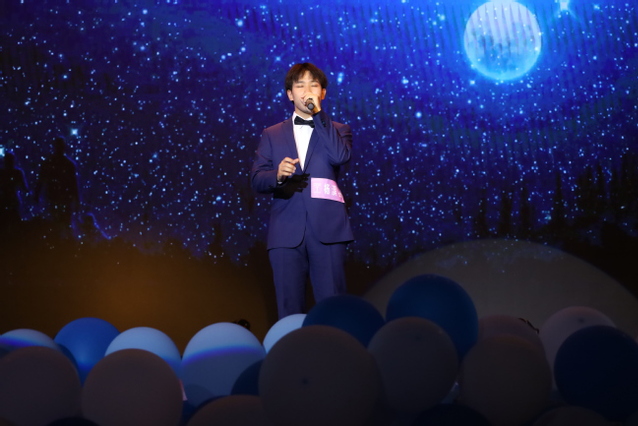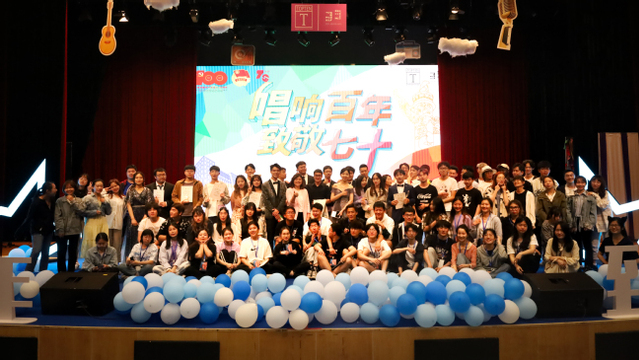The evening of May 18th witnessed the conclusion of the Top Ten Final Contest of the 33rd Singing Festival to celebrate the centennial anniversary of the founding of the Communist Party of China and salute to the 70th anniversary of the establishment of SUEP (Shanghai University of Electric Power) in the university auditorium located on Lin’gang Campus. Among the referees there are Gao Shan, a young singer from Shanghai Light Music Orchestra, Zhang Yun, head of the Multimedia Center affiliated to the Department of Party Committee Publicity, and Gao Xiao’ou, conductor of the University Chorus. The audience on the spot reached the number of almost 700.
This contest lasted almost two months. Eventually 16 groups of contesters went through three rounds of fierce competition into the final, among whom four groups of participants sing original music works while the other 12 groups of singers chant classical patriotic songs. The Final Contest was segmented into three rounds: singing 100 classical patriotic songs, assisting the leading singer, and the super combat. After three rounds of competition, Wang Yilong, a student from the College of Electric Engineering, won the championship and the title “Star of the Stars” with his amazing singing skills and marvelous songs of originality while the silver medal went to Yang Mingyu from the College of Foreign Languages and the bronze medal to Lin Sheng, an international student from the College of Economics and Management. The other seven Top Ten Singers are as follows: He Yaochi from the College of Economics and Management, Zou Yanni from the College of Electronics and Information Engineering, Li Jingyi from the College of Electrical Engineering, the band formed by Zhang Zhengyang from the College of Environmental and Chemical Engineering and Fu Chenjun from the College of Economics and Management, An Hengye from the College of Automation Engineering, and Wang Jiaying from the College of Foreign Languages. All the contesters who competed for their originality in music works have been honored as “the Most Outstanding Singers” and the four groups of singers won the prize “the Best Original Musical Works”. An Hengye was awarded the trophy “the Most Popular Singer” while Lin Sheng and Wang Yilong were merited as “the Best Performing Stylist”.
This year the Final Contest introduced some new rules and regulations to strengthen the highlights and activate the atmosphere on the spot. While the contesters were required to sing classical songs, they were also encouraged to plunge themselves into creating and singing some original music works. In the first round of singing classical songs, the contesters balloted stochastically to sing together the one hundred favorite songs of the university students in Shanghai during the last century, an event sponsored by the Shanghai Students’ Union. They related the centennial history of the Party with their voices. In the second round of assisting the leading singer, the contester collaborated with the guest singer to present their wonderful interpretation of their works. The last round “Super Combat” was especially eye-arresting. Three contesters were singled out by the judges to sing the song selected by themselves and the Final reached the climax.
The contesters launched a fierce competition and the audience, being enrapt and overwhelmed, frequently gave the singers immediate feedback. Hence the Recreational Center saw an exceptionally unprecedented grand festive occasion. The competition started with the prelude show “The Same Moonlight” presented by Cropfield Club of this university. The University Dance Troupe performed their show “Let’s Dance” and Zhang Peitong, champion of the 29th Singing Contest of Shanghai Dianji University, brought us his original music work The Lonely Night. The Contest ended up with the judges’ comments and a splendid and orderly prize-conferring ceremony.
These years the Top Ten Singing Contest of SUEP has been one of the most popular recreational activities favored by the university students. By seizing the opportunity to celebrate the centennial anniversary of the founding of CPC (Communist Party of China), the organizers adopted some scientific regulations so as to pass on the patriotic songs which have been sung generation after generation during the last one hundred years, satisfy the demands of the young college students, ignite their passion, promote their artistic taste, and help them in their spiritual growth by using the power of music. Up till today the contest has evolved into a significant platform to train and educate the young students.
 |
 |